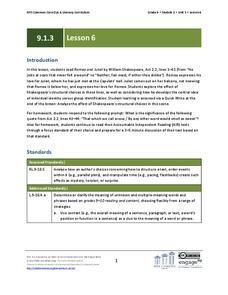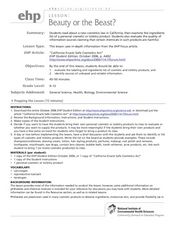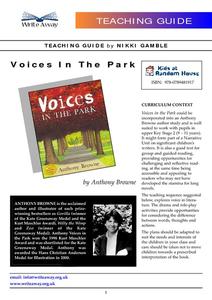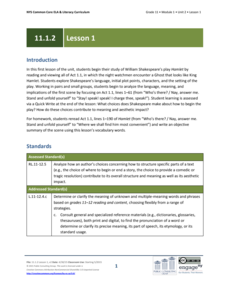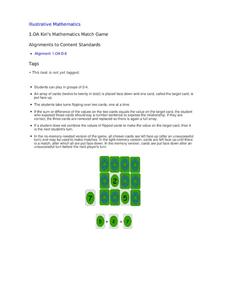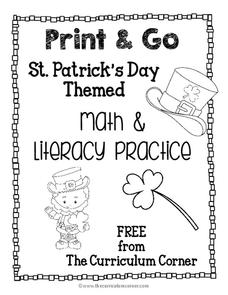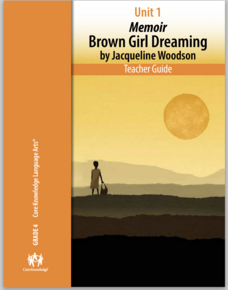EngageNY
Grade 9 ELA Module 1: Unit 3, Lesson 6
The balcony scene from Romeo and Juliet takes center stage as class members consider the structural choices Shakespeare makes, i.e., having Romeo appear first in the scene and having Juliet appear unaware that Romeo is listening to her...
EngageNY
Grade 10 ELA Module 4: Unit 3, Lesson 3
What's the difference between men and princes? Machiavelli discusses this distinction in chapter 18 of The Prince. Scholars first listen to a masterful reading of the chapter. Then, they write about how the author develops a central idea...
EngageNY
Grade 11 ELA Module 1: Unit 3, Lesson 3
Virginia Woolf didn't believe a woman could have written Shakespeare's works. Using the resource, scholars engage in a silent discussion to analyze how Woolf uses rhetoric to convey her point of view in A Room of One's Own. Pupils write...
EngageNY
Grade 11 ELA Module 2: Unit 2, Lesson 6
How did the women's rights movement create a ripple effect, improving the lives of future generations? Scholars read and analyze paragraphs 11-12 of "An Address by Elizabeth Cady Stanton," in which the author emphasizes the importance of...
EngageNY
Grade 11 ELA Module 2: Unit 2, Lesson 11
In Audre Lorde's poem "From the House of Yemanjá," the speaker describes her mother's two faces, adding a whole new meaning to the phrase "two-faced." Pupils first read the final stanza of the contemporary poem. With a Quick Write, they...
DK Publishing
Spot the Doubles
Have fun with counting and ladybugs! Kindergartners count the number of spots on the first half of the bug's wings, then double the number to practice their addition skills. Have kids color the ladybugs when they're finished with the...
Curated OER
Beauty or the Beast
Does the FDA really intend to protect public health? Spark a debate in your chemistry or health class by using this article, titled "Beauty or the Beast." It questions the safety of cosmetics and toiletry products, govenment regulations,...
Scholastic
Study Jams! Determine the Missing Operation in an Equation
Deepen the number sense of your math class with a short presentation on writing equations. Using the relationship between numbers, young mathematicians learn how to determine the missing operator in an equation. A number of opportunities...
The New York Times
Collateral Damage? Researching a Connection Between Video Games and Violence
Hook your class into an exploration of and discussion about violence in video games with a cute animal clip and a video game trailer. After a quick discussion about how media can affect mood, class members read a related article and...
Write Away!
Voices In the Park
Explore the impact a narrator's point of view has on a story with a reading of the children's book, Voices in the Park by Anthony Browne. Written in four different voices, the story is told and retold from different perspectives to...
EngageNY
Grade 9 ELA Module 1: Unit 3, Lesson 20
The final session in this 20-lesson plan unit asks individuals to use their Quick Writes, discussion notes, worksheets, and annotated text to craft and support a claim about how Shakespeare develops either Romeo or Juliet as tragic heroes.
EngageNY
Grade 10 ELA Module 4: Unit 3, Lesson 4
According to Machiavelli, a good ruler does whatever it takes. Using the resource, scholars work in small groups to analyze quotes from The Prince and then participate in a whole-class discussion. To finish, pupils select a phrase and...
EngageNY
Grade 11 ELA Module 1: Unit 2, Lesson 15
Scholars continue reading Act 3.1 from Shakespeare's Hamlet, discovering Ophelia's monologue about Hamlet. They complete a Quick Write to analyze Ophelia's perspective of Hamlet and participate in an optional jigsaw activity to explore...
EngageNY
Grade 11 ELA Module 1: Unit 2, Lesson 1
How can an author's decisions impact a text? Using an insightful resource, scholars begin their study of Hamlet by reading Act 1.1. They explore the language, characters, and setting in small groups. Upon finishing group work, pupils...
Curated OER
Reading Timetable
Word problems, telling time, and reading charts all come together on this page. After reviewing a table of different travel times for a bus, a tram, a taxi, and a trolley, third graders solve word problems about arrival times and stop...
Illustrative Mathematics
Coffee by the Pound
This is a great exercise in graphing proportional quantities to interpret the unit rate as the slope of a graph. It is not easy for learners to understand what a unit rate is. When it is presented as the slope of a linear line graph,...
Illustrative Mathematics
Kiri's Mathematics Match Game
Learning math is so much more fun when it involves playing games. Following the rules of the classic game Memory, young mathematicians flip over two cards at a time as they look for numbers whose sum or difference is equal to the value...
Polk Bros Foundation
Comprehensive Nonfiction Reading Questions
Analyze any nonfiction text with the set of questions on this sheet. Class members practice inferring by noting the main idea and purpose of a passage. They also analyze an opinion in the passage and write a brief summary. See the...
Curriculum Corner
St. Patrick's Day Themed Math and Literacy Practice
Look no further for St. Patrick's Day-themed math and literacy practice worksheets. Math skills allow for practicing counting to 100 by 5s, 10s, and 1s, as well as 10 more or 10 less, writing numbers in word and standard form,...
Curated OER
Character Analysis and The Crucible
Readers of The Crucible use a SATDO chart to collect evidence they will use to craft interpretive statements and an analysis of one of Miller’s characters. Background information on the play and about Miller, links to handouts,...
Curated OER
Toulmin Argument Essay
After viewing a Prezi presentation on Toulmin’s argument, (claim, reason, warrant, backing, grounds, qualifiers, rebuttals), groups re-examine the format, and then individuals craft an argument essay in response to Lord Chesterfields...
Core Knowledge Foundation
Unit 1: Memoir - Brown Girl Dreaming by Jacqueline Woodson
The memoir, Brown Girl Dreaming by Jacqueline Woodson, is the focus of a unit designed for fourth graders. Scholars begin each lesson with a warm-up, then listen to a read-aloud of a section of the book. Pupils complete word work,...
Core Knowledge Foundation
Unit 6: American Revolution
The American Revolution is the theme of a five-week unit that focuses on reading, grammar, morphology, and writing. Scholars read and respond to texts, practice spelling and word work, and write paragraphs. Assessments gauge comprehension.
Curated OER
Access Ramp
Just about every public building that your students are familiar with has an access ramp which complies with ADA requirements. As it turns out, designing such a ramp is an excellent activity to incorporate slope, the Pythagorean Theorem,...
